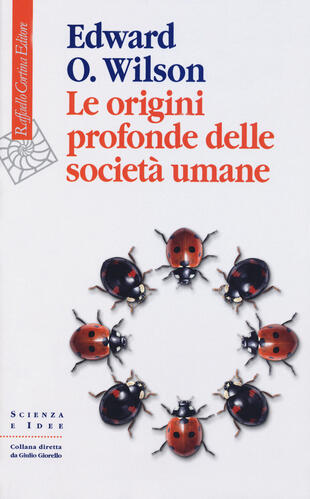

Sinossi
Per millenni filosofi, teologi e scienziati non sono riusciti a trovare risposte verificabili alle domande che definiscono il significato stesso dell'esistenza umana: che cosa siamo e che cosa ci ha resi quello che siamo. Nel suo esame della storia evolutiva, Wilson si spinge qui più indietro di quanto abbia mai fatto, consegnandoci un testo che mette in luce le origini profonde delle società animali e di quella umana. L'unico modo per comprendere il comportamento umano è cercare di conoscere le storie evolutive, lunghe e complesse, delle specie non umane. Tra queste almeno diciassette specie (roditori e gamberi tra gli altri) hanno sviluppato società avanzate e basate su livelli di altruismo e cooperazione simili a quelli che osserviamo tra gli esseri umani. Sulla scia di Darwin, che suggerì di studiare le origini dell'umanità tenendo conto del comportamento delle scimmie antropomorfe, Wilson sintetizza le più aggiornate ricerche svolte nel campo delle scienze dell'evoluzione, realizzando un'opera concisa ma rivoluzionaria sulla genesi della società umana. Prefazione all'edizione italiana di Telmo Pievani.
- ISBN: 8832851563
- Casa Editrice: Cortina Raffaello
- Pagine: 120
- Data di uscita: 19-03-2020
Recensioni
Within groups, selfish individuals win against altruists, but groups of altruists beat groups of selfish individuals.So when Benjen Stark throws a defeated Jon Snow onto his horse and sacrifices himself to an onslaught by a crazed zombie horde, it is an action that is advantageous to House Stark.
Interesting, but he uses a lot of technical jargon without needing to & often uses citations in a way that confused matters for me. His phrasing is often awkward & he's trying to fit too much information into this short of a book. His first chapter, "The Search For Genesis" was very thin, but he rea Leggi tutto
There exists within evolutionary theory a deep contradiction, one that Charles Darwin noticed back in the nineteenth century. The problem is this: how can evolution by natural selection account for altruistic behavior that benefits the group at the expense of the individual? The standard view of natu Leggi tutto
Génesis, publicado em 2019 por Edward O Wilson aborda-nos as origens biológicas do homem. Escrito mais sob a forma de ensaio, E. O. Wilson descreve-nos de uma forma sumária mas muito rica em exemplos, de que forma algumas espécies evoluíram e de que forma algumas se tornaram “Eussociais”. Apesar des Leggi tutto
Pequeño librito donde el autor, Edward, O. Wilson, nos habla del tema que siempre le ha apasionad: ¿de dónde surgió el altruismo? ¿de dónde surgió la selección social? Obviamente, algo genético debe haber. Para ello, recorre la historia de las especies eusociales centrándose, sobre todo, en las de lo Leggi tutto
Estamos ante un valioso viaje divulgativo sobre como las clásicas preguntas filosóficas sobre lo que somos, nuestro motivo vital y nuestra dirección como grupo, pueden recibir importantes aportes, lo más empíricamente cercanos a una "respuesta" de nuestro pasado evolutivo, a la luz de los registros Leggi tutto
This is a great little book by the esteemed Harvard University biologist about genetic bases for the formation of societies across different species. Not just humans, but complex social organizations within chimpanzees, ants, wasps, bees, spiders, termites, shrimp, naked mole rats, and various bird
Citazioni
Al momento non ci sono citazioni, inserisci tu la prima!























